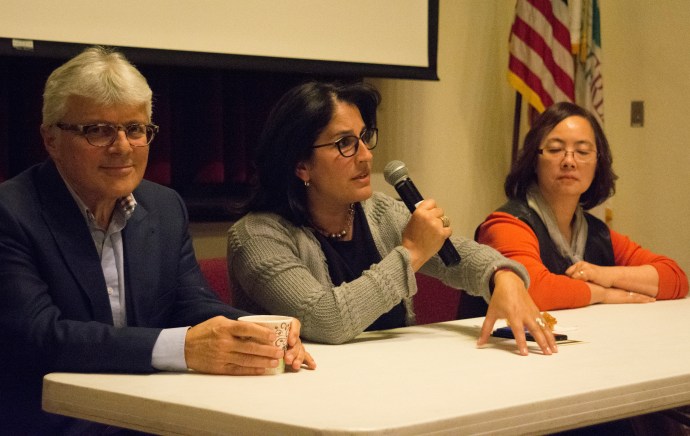Representatives from local Chinese and Persian groups introduced their reasons for coming to Great Neck and what they have done since then at a Great Neck Historical Society forum last week, in an effort to build bridges and greater understanding.
Common threads were woven throughout each of their presentations, such as an escape from persecution, the balancing act of assimilation and maintaining their culture, and the pursuit of a better life. They all also highlighted positive changes their communities have brought, like professionals, charity and fundraising.
“I think it was a wonderful opportunity for all of us to meet each other and to learn about each other’s culture,” Great Neck Historical Society President Alice Kasten said.
Most of the Chinese community in the initial boom in the 1990s had roots in Hong Kong and Taiwan, former Great Neck Chinese Association President Else Yung said, but many came from mainland China in the last decade. All their backgrounds also varied, she said, with professions ranging from doctors and engineers to restaurant owners and accountants.
But one thing that brought Yung here from neighboring Queens, she said, was the reputation of the school district.
“Although we have different backgrounds, we have similar values – most of which revolve around our children,” Yung said.
The Great Neck Chinese Association was founded in 1995 with many goals, including the promotion of community service, cultural exchange and helping immigrants integrate into the community, Yung said.
Since then the Chinese community has “made a significant impact here in Great Neck,” she said, hosting community events like Lunar New Year celebrations, fundraisers and a recent educational panel discussion with tips on how students can succeed.
She also highlighted the work of Lily Wang, who “devoted much of her life to community service” and “paved a road” for the local Chinese community, with an emphasis on exercising rights.
“Through our public service it allows us, as a Chinese community, to give back to a district that has given us so much,” Yung said.
Rebecca Sassouni, the president of the Sephardic Heritage Alliance Inc. and a school board trustee, drew upon research and the experiences of her own family to explain what attracted the Persian community to Great Neck.
Many people coming from Iran in the wake of the Islamic Revolution in 1978 were in a rush to escape, Sassouni said, so not too much thought went into where they would go.
“Most people were really just trying to get out and find a place to go where they would know somebody, or even if they didn’t know a lot of people, there would be some Jews and it would be safe because they were coming from a place where it was not safe,” Sassouni said.
The schools and proximity to New York City were also factors, Sassouni said, because many people who came over were merchants – even if they had lost a lot along the way.
Sassouni, who was born in the United States, also recalled some of her own experiences, like how a visit from the Shah of Iran in 1977 led to major protests in Washington, D.C., a classmate getting mad at her for the 1979 hostage crisis, and how she and her family would frequently go to Manhasset Valley Park in the 1980s where hundreds of people would be speaking Farsi to find each other.
Sassouni said that a history of persecution, backlash and separation has made members of the Persian community nervous about assimilation, simultaneously “fearing too much assimilation too fast” or “not enough assimilation fast enough.”
Ultimately though, Sassouni said, through SHAI and other organizations, they have become involved in fundraising, being the biggest not-for-profit sponsor of the Great Neck Social Center, engaging in voter registration drives and being elected to public offices – to name a few things.
Mansour Karimzadeh, chairman of the United Mashadi Jewish Community’s history and heritage committee, said that his community in particularly had to stick together and hide its faith for centuries in the city of Mashhad.
For a time after the 1930s, “things were good,” Karimzadeh said, with a shah who allowed for a Jewish presence. But some saw a downturn coming and left in the early 1970s, he said, with the majority leaving in the wake of the Iranian Revolution.
They found themselves in Queens before coming to Great Neck when they “became more prosperous,” Karimzadeh said.
“They all had to leave with nothing, even if they were merchants, even if they were businesspeople,” Karimzadeh said.
As a result, he said, the community has been tight-knit.
“This effect of being together for 200 years is still with us,” Karimzadeh said. “We, wherever we go, we feel ourselves being Mashadi and we’re sort of separate from the others.”
Now there are around 1,100 such families in Great Neck, Karimzadeh said. Together they have established three centers where they can congregate, volunteered for causes and organizations like the fire departments, and also become involved in public service.
“We are integrating with the community, we are giving back to the community when they helped us early on when we came here, and everything else, Rebecca [Sassouni] has said,” Karimzadeh said.
Manny and Laura Bardash, who have lived in Great Neck for 50 years, said the presentation was very personal and that it was an “outstanding way” to bring different groups together.
Laura Bardash, who is also a member of the Great Neck Historical Society, said the “universality of the experiences” was her favorite part of the event.
“It seems there’s always some people fleeing from one part of the country to someplace else, trying to find acceptance, prosper, and mostly take care of the family,” Bardash said.

